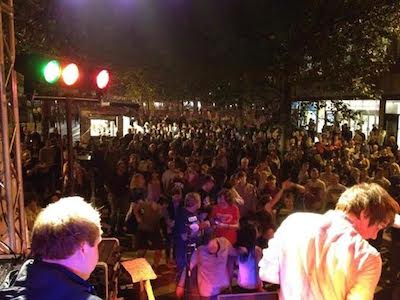The York and Leeds areas have been rife with bands splitting and moving on to new things, whether they be new projects or something different entirely.
Having supported the likes of Placebo, Biffy Clyro and Idlewild, York-based Colour Of Fire eventually burned out after getting within spitting distance of the big time. As well as performing with Rick Witter & The Dukes, Matt Lunn would go on to play drums in Officers for a time, and Owen Brinley formed the brilliant but ultimately ill-fated Grammatics, who themselves split up in 2010. He has now returned with a brand new project called Department M (pictured), whose moody electronic stylings are sure to turn heads.
Frenetic Leeds alt-rock group Mother Vulpine may have gone before their time, but great things sprung up after the group’s split. Matt Bigland would go on to form Dinosaur Pile-Up, Tom Hudson re-emerged as frontman of Pulled Apart By Horses, and Lins Wilson played cello in the final incarnation of Grammatics, as well as touring with Lone Wolf and assisting Pulled Apart By Horses at a number of shows.
Histrionic math-rockers ¡Forward, Russia! on the other hand, have kept a little quieter since their split in 2008. Drummer Katie Nicholson took time out to study, and vocalist Tom Woodhead currently runs a mastering studio called Hippocratic Mastering in Leeds. Guitarist Whiskas would eventually come out with his own solo project Honour Before Glory, and he released his debut album ‘This Is Broken Lines’ in 2011.
Now, let’s talk about The Seahorses – not strictly a York-based band, but one that featured some notable York musicians. Singer Chris Helme went on to have a successful career as a solo artist, most recently releasing his second album ‘The Rookery’ in 2012. Straightforward enough so far, but that’s not all – he would end up collaborating with bassist Stuart Fletcher in various guises over the years, most significantly in The Yards, who were active between 2002 and 2009. Fletcher has also played with Rick Witter & The Dukes, and is currently a member of up-and-coming York band We Could Be Astronauts.
Speaking of Rick Witter leads us neatly to Shed Seven. Witter formed Rick Witter & The Dukes following the band’s initial split, though the project seemed to fall by the wayside after the success of the Shed Seven reunion tour. As well as playing with his own band The Rising, guitarist/keyboardist Paul Banks was a member of the Alistair Griffin-fronted band Albion for a while, but he left shortly after the Shed Seven reunion was announced. Bassist Tom Gladwin seemed to have more success in sticking to his post-Shed Seven project People In Airports, who released their first album in 2010 and continued to play live until the end of 2011 – though they now seem to have disappeared. Drummer Alan Leach, on the other hand, focused his efforts on his iPhone quiz nights in York – this would eventually lead to the development of a SpeedQuizzing mobile app that’s now widely used in pubs and bars across the country.
There are also a couple of notable examples of Leeds-based bands reinventing themselves and going on to greater success – for example, indie rockers The Hair called it a day in 2008 and reformed as Club Smith shortly after. The most famous story, however, has to be that of Parva – or as you’re more likely to know them, Kaiser Chiefs. Dropped by their label shortly after releasing their debut record, the band regrouped and started again with a brand new name, and new material to go with it. An opening slot on 2005’s NME Awards Tour and their subsequent high placings in both the albums and singles charts would go on to catapult Kaiser Chiefs into the big time. The group’s success has continued to this day – numerous hits and countless festival slots later, the band will play the very first show at the new Leeds Arena when it opens in September 2013.






